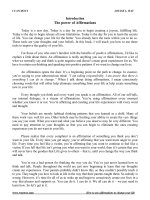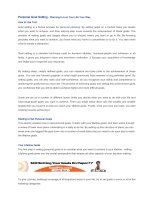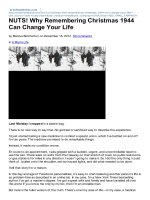Your playlist can change your life
Bạn đang xem bản rút gọn của tài liệu. Xem và tải ngay bản đầy đủ của tài liệu tại đây (1.44 MB, 423 trang )
Copyright © 2012 by Galina Mindlin, Don
DuRousseau, Joseph Cardillo
Cover and internal design © 2012 by Sourcebooks,
Inc.
Cover design by The Book Designers
Cover images © Shutterstock.com
Sourcebooks and the colophon are registered
trademarks of Sourcebooks, Inc.
All rights reserved. No part of this book may be
reproduced in any form or by any electronic or
mechanical means including information storage
and retrieval systems—except in the case of brief
quotations embodied in critical articles or reviews
—without permission in writing from its publisher,
Sourcebooks, Inc.
This publication is designed to provide accurate
and authoritative information in regard to the
subject matter covered. It is sold with the
understanding that the publisher is not engaged in
rendering legal, accounting, or other professional
service. If legal advice or other expert assistance
is required, the services of a competent
professional person should be sought.—From a
Declaration of Principles Jointly Adopted by a
Committee of the American Bar Association and a
Committee of Publishers and Associations
This book is not intended as a substitute for
medical advice from a qualified physician. The
intent of this book is to provide accurate general
information in regard to the subject matter covered.
If medical advice or other expert help is needed,
the services of an appropriate medical
professional should be sought.
All brand names and product names used in this
book are trademarks, registered trademarks, or
trade names of their respective holders.
Sourcebooks, Inc., is not associated with any
product or vendor in this book.
Published by Sourcebooks, Inc.
P.O. Box 4410, Naperville, Illinois 60567-4410
(630) 961-3900
Fax: (630) 961-2168
www.sourcebooks.com
Library of Congress Cataloging-in-Publication
Data
Mindlin, Galina.
Your playlist can change your life : ten proven
ways your favorite music can revolutionize your
health, memory, organization, alertness, and more /
Galina Mindlin, Don DuRousseau, Joseph
Cardillo.
p. cm.
Includes index.
(pbk. : alk. paper) 1. Music Psychological
aspects. 2. Music Physiological aspects. 3. Self-
actualization (Psychology) I. DuRousseau, Don. II.
Cardillo, Joseph, 1951- III. Title.
ML3838.M647 2012
781’.11–dc23
2011035363
Printed and bound in the United States of America.
VP 10 9 8 7 6 5 4 3 2 1
Dedications
For everyone with an open mind…
And for my family: husband, Denis;
daughter, Alyona;
Mom and Dad; and my friends who are
sharing
the passion and excitement with me in many
moments on my life journey.
—Galina
For my son, LCpl Gerald DuRousseau,
USMC,
our military forces in harm’s way, and to all
our
nation’s first responders, especially those
who
assisted in my research.
—Don
For my wife, Elaine, and our daughters,
Isabella
and Veronica, whom we loved before they
were
born, and to my mother and father,
Josephine and Alfio Cardillo.
—Joseph
Without music, life would be a mistake.
—Friedrich Nietzsche
CONTENTS
Acknowledgments
Introduction
Chapter 1: How to Use Music to Make Your
Mind Flow
Chapter 2: How to Use Music to Keep Your
Mind Flowing
Chapter 3: How to Use Music to Alleviate
Anxiety
Chapter 4: How Music Can Increase Your
Alertness
Chapter 5: How to Use Music to Feel Happier
Chapter 6: How Music Can Organize Your
Brain
Chapter 7: How Music Can Sharpen Your
Memory
Chapter 8: How to Use Music to Improve Your
Mood
Chapter 9: How to Use Music to Live Creatively
Chapter 10: How to Use Your Brain’s Own
Music
Conclusion
Glossary
About the Authors
ACKNOWLEDGMENTS
The authors wish to convey their gratitude to Linda
Konner (their literary agent) and everyone at
Sourcebooks, especially to Shana Drehs, Regan
Fisher, Heather Hall, Katherine Faydash, Ashley
Haag, Rachel Edwards, Danielle Trejo, Sarah
Cardillo, Dawn Adams, Mallory Kaster, and Katie
Casper.
Special thanks (from Galina) to BMT
providers: Drs. George Rozelle, Orli Peter, Carol
Kershaw, Bill Wade, Fred Kahan, David Mitnick,
Susan Clear, Michael Cohen, Steven Kahan, Jane
Price, Jim Evans, and all other providers.
Special thanks to her colleagues from Moscow
Medical Academy: Professor Dr. Levin, who
developed Brain Music, and his business partner,
Dr. Goldstein; and to her BMT research team, Don
DuRousseau, Dr. Deborah Haller, and Dr. Colette
Haward.
Special thanks to her husband Dr. Kapkov and
Dmitrij Gavrilov for providing BMT technical
support and to her publicist, Janet Appel, who did
an excellent job in raising public awareness of
BMT, evidence-based technology. And special
thanks to her colleagues who shared her
enthusiasm for BMT and integrative medicine: Dr.
John Slaughter and Dr. Richard Brown.
Special thanks to her parents, Rita and Eolf,
who gave her an opportunity to graduate from
music, dancing, and medical school and granted
her the best of her “brain music.” Special thanks to
her daughter Alyona for embracing and inspiring
her “brain music” and her husband Denis for
sharing her music soundtracks with her in many
ways.
Special thanks (from Don) to the National
Sheriffs’ Association and the International
Association of Fire Chiefs for agreeing to
participate in the brain music research, to Mary
Margaret Walker for her dedicated efforts as a
research assistant, and to Pamela DuRousseau,
MPH, RD, for providing extensive knowledge of
nutritional science related to development and
long-term maintenance of brain health.
Special thanks (from Joseph) to his wife
Elaine, daughters, and extended family and friends
who supported him throughout this project; to the
State University of New York for its many years of
encouragement and support toward his research in
whole-person health care; to his brother Alfred
Cardillo for his guidance and deep expertise in
health care; to all of his colleagues in holistic arts,
sciences, and medicine; to his colleagues at
Psychology Today, Personal Excellence, and
Smart Supervision for encouraging his early
writings on Music On Your Mind; and to his
father, Alfio Cardillo, for sharing with him his
love for music and especially for giving him his
first violin lesson as a teenager.
INTRODUCTION
What could you learn about yourself if you could
peer into your brain and see what it looks like
when you are listening to your favorite music?
We all intuitively know how good it feels to
get in our car, turn on the radio, and hear our all-
time favorite song. But imagine being able to
power up your brain with that clean, positive
energy at will, anytime and anywhere, without
negative side effects. Now imagine being able to
think more clearly than usual, with a heightened
perception of your surroundings, and being able to
reach that state whenever you need to, wherever
you are. It doesn’t matter if your musical taste is
Luciano Pavarotti, Bono, Billie Holiday, or Muse.
You can achieve this state, and this book will
show you how.
There is much new scientific research to
document the profound influence of music on your
physical, psychological, and spiritual well-being.
In fact, whenever people come together for
weddings, funerals, graduations, sports, worship,
recreation, romance, dinner, or entertainment,
music is there. Independent of our backgrounds and
beliefs, our customs and traditions, music has a
primary role in all aspects of our lives.
Historically, rhythm, music, and song have
been used as a way to tune the mind, to heal the
body, and to strengthen the spirit. Music is even
viewed today as a way to connect to the universe
itself. Not surprisingly, the core features of music
are RHYTHM, HARMONY, RESONANCE,
SYNCHRONY, and DISSONANCE (see glossary
for definitions of terms), and those are the same
processes the brain uses to coordinate its activities
and carry out complex behaviors. This is why
music can have such a profound effect on us.
Thanks to several new advances in
neuroimaging technology, we now know that music
affects every part of the brain and has the potential
to exert powerful influence over its control
systems. And because those systems regulate much
of our thought processes and goal-directed actions,
music can influence our perceptions, emotions,
memories, neurochemistry, and ultimately our
behavior. In the long term, music can begin to
change how our higher brain systems operate by
increasing our ability to adapt to stress and
allowing us to evolve a new way of thinking, one
in which you can use music as a support
mechanism in all that you do.
Your Playlist Can Change Your Life is an
attempt to take something we all already love—
music—and view it through the lens of
revolutionary, frontier neuroscience, which has
opened a treasure chest of new and exciting ways
to use the incredible elixir of music to enhance our
daily lives.
Did you know that:
The rhythms in the brain are organized by the
same principles as music.
Your brain processes music differently than
language and mathematics, yet music can
influence your proficiency in each.
Musical processes that engage in the womb
may affect you for the rest of your life.
Calmness requires more of your body’s
energy than alertness, and music can help
you set the balance between the two.
Music, like scent, has an immediate neuro
pathway that can bypass your thinking brain
and directly affect your emotional state.
Musical ability is natural to the human
species and not just a rare talent.
Your brain waves can be turned into musical
notes using a computer and a mathematical
algorithm, and that music can help improve
your sleep, mood, and even on-the-job
performance.
Most important, music can be used to trigger
various mental states that range from being highly
focused and vigilant to feeling an all-encompassing
calm and relaxed attitude, all without having to use
harmful drugs.
All you need to do is choose a playlist that
activates the brain networks that will meet your
demands and hit the play button. Your playlist will
unlock your brain’s hardwired musical remedy,
ultimately putting you in your best mind-set to meet
your goals. In short, you can use your self-
prescribed personal playlist to achieve a higher
level of mental functioning and to enhance your
well-being in all that you do.
Based on many years of research as well as
new research that is not available anywhere else,
Your Playlist Can Change Your Life will provide
you with scientifically proven, step-by-step
methods to use your favorite music to enhance your
health, memory, organization, alertness, and more.
Today there is a burgeoning demand for
personalized health care and wellness. People
want information that is suited to them, solutions
that are natural and effective. In this spirit, we’re
bringing our unique blend of expertise in
NEUROPSYCHIATRY, NEUROPHYSIOLOGY,
COGNITIVE NEUROSCIENCE, psychology,
brain research, clinical medicine, and human
performance improvement to bear in this book. We
are on a mission, of sorts, to bring you a
scientifically proven, self-regulatory program that
uses one of life’s greatest pleasures—music.
Ultimately, you will get a glimpse of what goes on
in your own brain when listening to your favorite
playlist, and you will learn how to use the power
of music to stay mentally sharp and focused, with
increased rates of performance and with an
enhanced ability to fight off stress, insomnia,
anxiety, depression, and even addiction.
Your Playlist Can Change Your Life will take
you to the frontiers of medicine, neuroscience,
psychology, and personalized health care straight
into a world of sound, rhythm, music, and song. It
will unleash a seemingly magical force within your
own brain that is capable of wielding great synergy
within your body as well as your mind.
We speak as one voice in this book, but
you’re actually reading the combined
experience and expertise of three people:
Galina Mindlin, MD, PhD; Don DuRousseau,
MBA; and Joseph Cardillo, PhD. You can
read more about us on page 231, but we want
to give you an idea of who your tour guides
will be on this journey.
Galina is Your Playlist’s lead scientist.
She is a founder of BRAIN MUSIC
THERAPY (BMT) in the United States (you’ll
read more about BMT in chapter 10).
Don brings his unique blend of
neuroscience and business expertise to Your
Playlist. He is the founder and chief executive
officer of Human Bionics, LLC, and the
executive director of Peak Neurotraining
Solutions Inc.
Joseph is a top-selling author in the fields
of health, mind-body-spirit, and psychology.
He has a doctorate in holistic psychology and
mind-body medicine. He has taught at various
universities, including the University at
Albany and Hudson Valley Community
College.
How to Use This Book
Each chapter presents one of ten scientifically
proven ways that music can help you heighten your
level of peak performance and achieve better
health and harmony in your day-to-day living. You
will learn how to:
1. Use songs to launch your brain into its most
optimal mind-set
2. Use music to keep that mind-set flowing
from one task to another, one day to another
3. Use music to bring calm to your daily
routines and to train your brain to
automatically start calming you whenever
you need it
4. Use music to boost your mental alertness
whenever and wherever you need it and to









